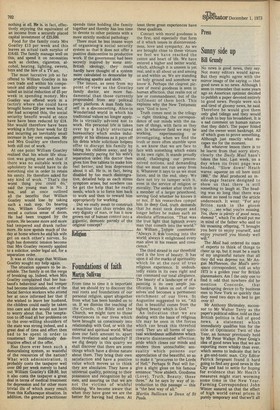Religion
Foundations of faith
Martin Sullivan _.
From time to time it is important that we should try to discover the real roots and foundations of our personal religion, apart altogether from what has been handed on to us. If we dismiss the teaching of the Creeds, the Bible and the Church, we might turn to those experiences in our lives which have brought us consciously into relationship with God, or with the external and spiritual world. What does our faith amount to, apart from revelation and authority? If we dig deeply in this quarry we shall discover that there are some things which have a divine nature about them. They bring their own satisfaction and have a positive value which moves us to think they are absolutes, They have a universal quality, pointing to their possession and recognition by all men, and assuring us that we are not the victims of wishful ,thinking. We become aware that when they have gone we are the better for having had. them. At
least three great experiences have these qualities.
Contact with moral goodness is the first, and especially that form of it which issues in disinterested ness, love and sympathy. As we are brought close to these virtues we feel we have reached the centre and heart of life. We have entered a higher and better world, which, although it is unseen is yet real, and is all about us and among us and within us. We are standing on holy ground and somehow we know it. Perhaps the clearest picture of moral goodness is seen in human affection, that realm not of law or commandment, but of the fulfilment of them both. This explains why the New Testament says "God is love."
Truth comes next in the trilogy — right thinking, the correspon dence of our minds with the nature of things, with facts as they are. In whatever field we may be working, experimenting or investigating, when we find the truth or more often stumble upon it, we know that we are face to face with something which exists in its own right. It stands proudly aloof, challenging our precon ceived notions, and demanding that we must not run away from it. Whatever it says to us we must listen, and in the end, obey. We dare not try to tamper with it, even in the service of religion or morality. The seeker after truth is a member of a larger priesthood, serving God whether he knows it or not. If his researches cpmpel him to deny God, truth demands that he must seek deeper and longer before he makes such an absolute affirmation. "That was the true light that lighteth every man that cometh into the world." As William Terhple comments: "Always it vitas coming into the world; always it enlightened every man alive in his reason and conscience."
The third strand in our threefold cord is the love of beauty. It has upon it all the marks of spirituality which lie at the root of true religious experience. It undoubtedly exists in its own right and can command our total allegiance.
The beauty of a landscape or of a painting is its own ample jus tification. It takes us out of our selves and becomes a permanent enrichment of our lives. St Augustine suggested to us, "All that is beautiful comes from the highest, beauty which is God."
An indication that we are dealing with the basis of religious life may be seen in the forces which can break this threefold cord. They are all forms of spiri
tual wickedness: selfishness which
thwarts disinterested affection; pride which closes our minds and renders them unteachable; sen suality which poisons our appreciation of the beautiful, so as to make it "procuress to the Lords of Hell." Perhaps St Paul will for:, give a slight gloss on his famous
sentence: "Now abideth, Goodness (Love), Truth, Beauty, these three." As he says by way of introduction to this passage — this is "the best way of all."
Martin Sullivan is Dean of St Nuts.










































 Previous page
Previous page